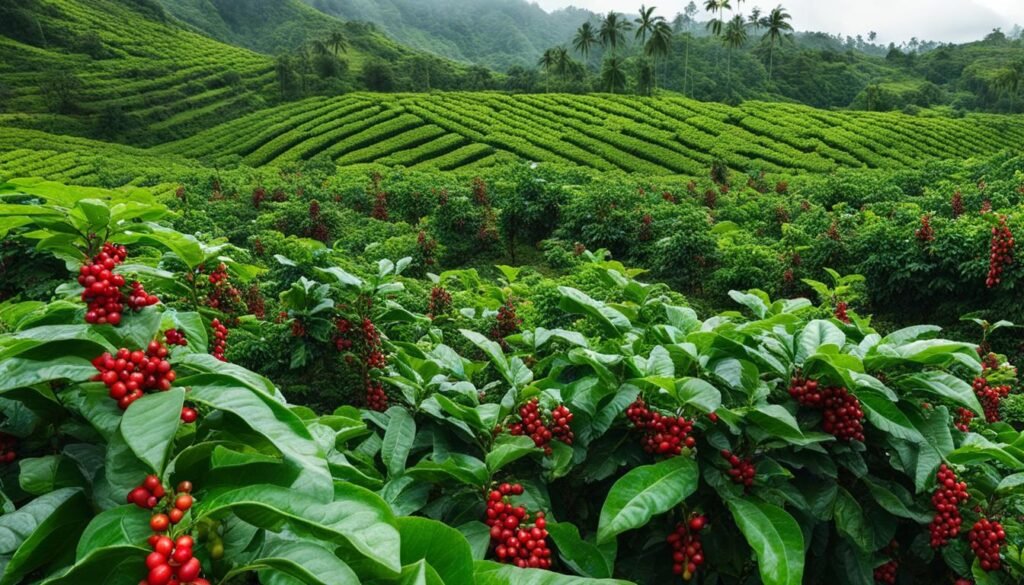Welcome to our guide on finding low caffeine alternatives in the world of coffee. Whether you’re looking for a milder option or trying to cut back on caffeine, we’ve got you covered. Join us as we explore different coffee types, genetically modified plants, and naturally low-caffeine varietals.
When it comes to low caffeine coffee, there are several options available. Understanding the caffeine content in different coffee types is key to finding the least caffeinated option that suits your preferences. Additionally, exploring coffee brands that prioritize reduced caffeine options can provide you with a range of choices.
Key Takeaways:
- Not all coffee is created equal when it comes to caffeine content.
- Naturally low-caffeine varietals, such as Coffea Lancifolia and Arabica Laurina, offer milder alternatives.
- Genetically modified coffee plants with reduced caffeine content are being developed as an alternative to decaf.
- Arabica coffee generally has lower caffeine levels compared to Robusta coffee.
- Consider your preferences and caffeine tolerance when choosing a coffee with minimal caffeine content.
Now that you have a better understanding of low-caffeine coffee options, you can confidently explore new flavors and enjoy your cup of joe without worrying about excessive caffeine intake. Stay tuned for more insights on this topic!
Naturally Low-Caffeine Coffee Varietals
If you’re someone who enjoys the flavor and ritual of coffee but wants to reduce your caffeine intake, there are naturally low-caffeine coffee varietals that offer a milder alternative. These varietals, such as Coffea Lancifolia, Coffea Racemosa, and Arabica Laurina, have inherently lower caffeine levels compared to other coffee varieties. While they may produce less coffee overall, they still provide a great taste experience.
What makes these varietals low in caffeine is an interesting genetic mutation that impacts the responsible gene. This mutation causes the plants to produce beans with significantly reduced caffeine content. In addition to their naturally low caffeine levels, these varietals can be easily crossed with other known coffee varieties, allowing for the creation of unique and flavorful coffee blends.
The Benefits of Naturally Low-Caffeine Coffee Varietals
Choosing naturally low-caffeine coffee varietals comes with several benefits. Firstly, you can still enjoy the taste and aroma of coffee without the jitters and potential negative effects of high caffeine consumption. Secondly, these varietals provide a gentler caffeine experience, making them suitable for individuals with caffeine sensitivities or who prefer a milder coffee option. Lastly, their unique flavor profiles can offer a refreshing change from the more commonly consumed coffee varieties.
| Varietal | Caffeine Level |
|---|---|
| Coffea Lancifolia | Approximately 1.2% caffeine content |
| Coffea Racemosa | Approximately 1.7% caffeine content |
| Arabica Laurina | Approximately 0.4% caffeine content |
While naturally low-caffeine coffee varietals may not be as widely available as other types of coffee, they offer a unique and satisfying coffee experience for those seeking to reduce their caffeine intake without compromising on taste. Consider exploring these varietals to discover new flavors and enjoy coffee in a different way.
Genetically Modified Coffee Plants with Reduced Caffeine

In our pursuit of low-caffeine alternatives, researchers have made significant strides in developing genetically modified coffee plants with beans that contain up to 70% less caffeine. By blocking a gene responsible for one of the enzymes involved in caffeine production, these plants produce coffee beans with significantly reduced caffeine content. This presents a potential alternative to the traditional decaffeination process, which can sometimes affect the taste of the coffee.
The technique of genetically modifying coffee plants to reduce caffeine content has shown promising results. Not only does it offer a way to obtain low-caffeine coffee beans, but it also preserves the natural flavors and characteristics of the coffee. This innovative approach to caffeine reduction can be applied to Arabica coffee plants as well, which make up a significant portion of the global market.
With genetically modified coffee plants, coffee enthusiasts can enjoy their favorite beverage with reduced caffeine content without sacrificing taste. These plants offer a new avenue for producing low-caffeine coffee beans, allowing individuals to tailor their coffee consumption to their preference and caffeine tolerance. As further research and development continue in this field, we can expect to see more genetically modified coffee options available in the market, providing coffee lovers with even greater choices.
Reduced Caffeine Content in Coffee Beans
To illustrate the impact of genetic modification on caffeine content, we present the following table comparing the caffeine levels in genetically modified coffee beans with conventional coffee beans:
| Coffee Bean Type | Caffeine Content (per 100g) |
|---|---|
| Conventional Coffee Bean | 95mg |
| Genetically Modified Coffee Bean | 29mg |
As shown in the table, genetically modified coffee beans have a significantly lower caffeine content compared to conventional coffee beans. This reduction in caffeine opens up possibilities for individuals who are looking for a milder coffee experience or wish to reduce their overall caffeine intake. With ongoing advancements in genetic modification techniques, we can anticipate further improvements in reducing caffeine content without compromising the taste and quality of coffee.
Caffeine Content in Different Coffee Types

When it comes to caffeine content, not all coffee types are created equal. The caffeine levels can vary depending on the type of coffee and the brewing method. Here, we’ll explore the caffeine content in different coffee types, allowing you to make an informed choice when selecting your morning brew.
Arabica vs. Robusta Coffee
Arabica coffee and Robusta coffee are the two main species used for commercial coffee production. In general, Arabica coffee typically has lower caffeine levels compared to Robusta coffee. A cup of Arabica coffee brewed from Arabica beans contains around 60-100mg of caffeine, while Robusta beans can have a caffeine content of 1.7%-4%. This higher caffeine content in Robusta makes it more suitable for strong coffee preparations like espresso.
Variations in Caffeine Content
It’s essential to note that caffeine content can also vary within each coffee type due to factors such as the roast level and brewing method. Darker roasts tend to have slightly lower caffeine content compared to lighter roasts, as the roasting process can reduce caffeine levels. Additionally, the brewing method can influence the caffeine extraction. For example, espresso generally has higher caffeine concentrations than drip-brewed coffee due to the shorter extraction time.
| Coffee Type | Caffeine Content (mg) |
|---|---|
| Arabica (brewed) | 60-100 |
| Robusta (brewed) | 1.7%-4% |
| Espresso (standard serving) | 63 |
| Instant Coffee (brewed) | 30-90 |
Table: Caffeine Content in Different Coffee Types
Keep in mind that the caffeine content listed above is an approximate range and can vary depending on various factors. If you’re looking for coffee with the least caffeine, consider opting for Arabica coffee brewed from Arabica beans or explore decaf coffee options, which undergo a decaffeination process to remove most of the caffeine.
Conclusion
If you’re looking for low caffeine coffee options, we’ve got you covered. There are various choices available that will satisfy your craving for coffee with minimal caffeine content.
You can start by exploring coffee varietals that are naturally low in caffeine. Coffea Lancifolia, Coffea Racemosa, and Arabica Laurina are excellent options that offer a milder alternative for coffee enthusiasts. These varietals may produce less coffee compared to high-caffeine varieties, but they still deliver great flavor.
Another promising option is genetically modified coffee plants. Scientists have developed these plants to produce beans with reduced caffeine content, offering potential alternatives to the traditional decaffeination process. By blocking a specific gene responsible for caffeine production, these plants can produce coffee beans with significantly lower caffeine levels. This technique can be applied to Arabica coffee plants, which are prominent in the global market.
For those who prefer decaf coffee, it’s essential to note that while it provides a low-caffeine alternative, it still contains a small amount of caffeine. So, consider your preferences and caffeine tolerance when selecting your coffee with minimal caffeine content.
FAQ
What coffee varietals have the least caffeine?
Some coffee varietals naturally have low levels of caffeine, such as Coffea Lancifolia, Coffea Racemosa, and Arabica Laurina.
Are there genetically modified coffee plants with reduced caffeine?
Yes, researchers have developed genetically modified coffee plants that produce beans with up to 70% less caffeine.
How does the caffeine content vary in different coffee types?
Arabica coffee typically has lower caffeine levels compared to Robusta coffee. Different brewing methods can also affect caffeine content.
What are some low-caffeine coffee options?
You can try naturally low-caffeine varietals, genetically modified coffee plants, or decaf coffee, which contains a small amount of caffeine.

Leave a Reply